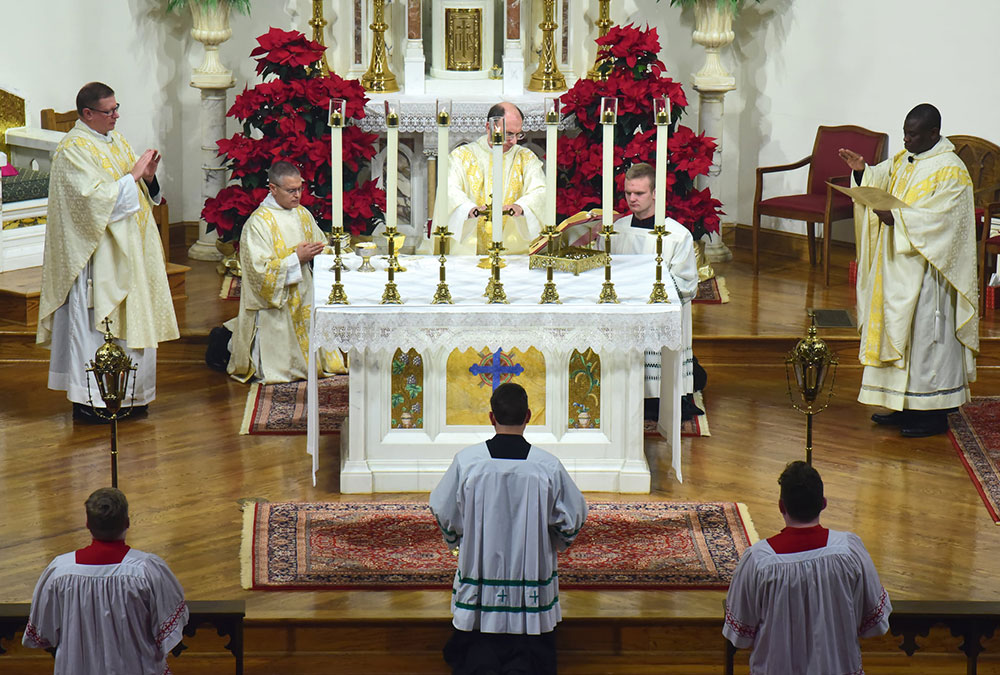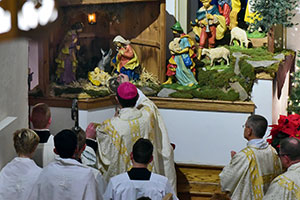 CHARLOTTE — This year, with the easing of pandemic restrictions, Bishop Peter Jugis will celebrate four liturgies at St. Patrick Cathedral for Christmas and two feast days marking the New Year.
CHARLOTTE — This year, with the easing of pandemic restrictions, Bishop Peter Jugis will celebrate four liturgies at St. Patrick Cathedral for Christmas and two feast days marking the New Year.
Each Mass is open to the public and will be livestreamed on the parishes' YouTube channel.
Bishop Jugis will serve as principal celebrant at the following liturgies:
> Dec. 25 – Midnight, Mass for the Feast of the Nativity of the Lord
> Dec. 26 – 11 a.m., Mass for the Feast of the Holy Family of Jesus, Mary, and Joseph
> Jan. 1, 2022 – 11 a.m., Mass for the Feast of the Solemnity of Mary, Mother of God
> Jan. 2 – 11 a.m., Mass for the Feast of the Epiphany of the Lord
Christmas carols will be sung by the Cathedral choir 30 minutes prior to the midnight Mass.
All are welcome. Masks are required per the Charlotte city ordinance.
— Catholic News Herald
Bishop Jugis encourages people to ‘take courage’ in Jesus this Christmas
 Bishop Jugis consecrates the Eucharist during Christmas midnight Mass Dec. 25 at St. Patrick Cathedral. (Photo by James Sarkis)CHARLOTTE — Decorations, songs and gifts help “set the tone,” but profound joy is at the heart of Christmas – joy that our Savior has come to help us and save us, Bishop Peter Jugis preached Dec. 25.
Bishop Jugis consecrates the Eucharist during Christmas midnight Mass Dec. 25 at St. Patrick Cathedral. (Photo by James Sarkis)CHARLOTTE — Decorations, songs and gifts help “set the tone,” but profound joy is at the heart of Christmas – joy that our Savior has come to help us and save us, Bishop Peter Jugis preached Dec. 25.
During midnight Mass to usher in Christmas celebrations at St. Patrick Cathedral, Bishop Jugis encouraged people to take to heart the angel’s words in Luke’s Gospel: “I proclaim to you good news of great joy.”
The angel’s joyful message to the shepherds – and to us – means “you are not alone. The Savior has come for you,” the bishop said. “The Savior is now here, so take courage.”
Masses at the cathedral and most churches around the Diocese of Charlotte this Christmas were being held in person and with fewer restrictions due to the pandemic than last year.
“Certainly there are many problems and difficulties, concerns and anxieties we face in our daily lives,” the bishop said, “but this day the angel announces that we are to have joy – despite those problems and difficulties, concerns and anxieties.”
“Jesus the Savior has come to help you and to save you. A savior has come for you, to be with you, to help you bear your burdens,” he said.
“If you are lost or struggling, take courage! You now have a savior, a savior has come for you.
“If you have suffered a family tragedy or sorrow, or your heart is heavy at this time, take courage – you now have a savior. A savior has come for you.”
As the Nativity story illustrates, Joseph and Mary experienced hardships – leaving the comfort of home to travel to Bethlehem, then having to seek shelter in a stable so that Mary could give birth to Jesus, the bishop noted.
 Bishop Peter Jugis incenses the manger scene at the start of midnight Mass Dec. 25 at St. Patrick Cathedral. (Photo by James Sarkis)“And yet, despite all of that, when the child is born, all those difficulties take second place to the joy that fills the hearts of Joseph and Mary at the birth of the child Jesus,” he said.
Bishop Peter Jugis incenses the manger scene at the start of midnight Mass Dec. 25 at St. Patrick Cathedral. (Photo by James Sarkis)“And yet, despite all of that, when the child is born, all those difficulties take second place to the joy that fills the hearts of Joseph and Mary at the birth of the child Jesus,” he said.
“Joy takes over. True joy erupts in a stable in Bethlehem, of all places,” he said. That joy “will eventually embrace the entire world as the Christian message spreads.”
Bishop Jugis urged people not to let the difficulties of life crowd out Jesus from their hearts or their families.
“Make room for Christmas joy and gladness – today and always,” he said, encouraging people “to be joyful for all the gifts and blessings that God has bestowed on your family; to be joyful for God’s presence in your family, and in your home.”
He prayed, “May God bless your family, and may He bless your home with Christmas joy – a joy which comes because you know and love and serve Christ the Lord, who has come to be with you, to save you, and to help you always.”
— Patricia L. Guilfoyle, editor, Photos by James Sarkis
BELMONT — At the intersection of faith and sport is where you’ll find Belmont Abbey College’s president, Dr. Bill Thierfelder.
Thierfelder has accomplished many things during his 18-year tenure as president, but it was his vision for the Sport Virtue Institute that will leave an enduring legacy at the college.
Upon his arrival at the college in 2004, Thierfelder established his plan with a guiding belief that sports can develop virtuous characteristics as well as physical prowess. Thus, the Sport Virtue Institute was born.
It has grown today to serve as a model for 900 student-athletes competing in more than 30 sports at Belmont Abbey College.
“Since I got here, our mission has revolved around the development of sport and virtue,” Thierfelder said. “Some people think that there’s a choice to be made in that you have to be a really good athlete or a really good person and that the two are somehow mutually exclusive. Of course, they’re not.
“It’s the reality of how sport and virtue are intimately linked together. They are not two separate things.”
That is something that senior Lauren Hamilton came to know intimately after four years as a standout volleyball player for Belmont Abbey. Hamilton serves as a case study in the program’s success.
“Having a large community of Catholic athletes, who are also living out their faith while competing in sports has taught me so much about how sport and virtue are intertwined,” Hamilton said. “It’s something I’d never experienced before. Sports were just for fun in high school. You wanted to be the best, but you never brought faith into that. At Belmont Abbey, I really learned how important my faith is to sport and how I should apply it to every aspect of being an athlete.”
Hamilton, who has spent four years in FOCUS (Fellowship of Catholic University Students) since coming to the college as a freshman, has distinguished herself both on and off the court. She served as a student missionary in the program and helped lead weekly Bible studies along with an athlete community night.
“That’s been a big blessing for me,” said Hamilton, who was also a recipient of the Hintemeyer Catholic Leadership Scholarship.
Hamilton recently accepted a full-time missionary role at FOCUS with training to start shortly after her graduation in May. Then, she is committed to serve a two-year term as a missionary at a college or university across the country.
Belmont Abbey College is a Division II school and a member of Conference Carolinas. It’s also the only Catholic institution among the conference’s 13 member schools. After a series of discussions and presentations, Thierfelder helped play a pivotal role in shaping how the conference was viewed nationally.
“The blessing and the miracle to me is that the conference changed its tagline,” he said. “The tagline of Conference Carolinas is champions of mind, body and soul.”
From its inception, the Sport Virtue Institute has also served as a blueprint for other colleges and universities. It was important for organizers to see the concept spread beyond the boundaries of Belmont Abbey College.
“The hope was we could go beyond just doing it here and help affect other institutions across the country,” he said.
To that end, Thierfelder noted that Franciscan University of Steubenville, Christendom College and Ave Maria are examples of schools who have also aligned with the mission.
The timing proved to be providential when it came to the alignment of sport and virtue. As Thierfelder was just starting at Belmont Abbey College, then-Pope John Paul II created a section under the Pontifical Council of the Laity for Church and Sports. That following year a group of 50 experts from 18 countries convened at a meeting to assess the role that sports played in the world.
It was there that Thierfelder met Ray McKenna, founder of the national organization called Catholic Athletes for Christ. He now serves on the board of directors for CAC.
The confluence of events helped shape a powerful perspective that remains in play today at the Sport Virtue Institute.
“From the beginning, I wanted to bring home the reality that we are body, mind and soul,” he said. “It’s the whole person. It’s important that we operate that way and think that way. We perform very well on the fields and on the court, but it goes much deeper than that.”
— Kris Johnson, Correspondent

